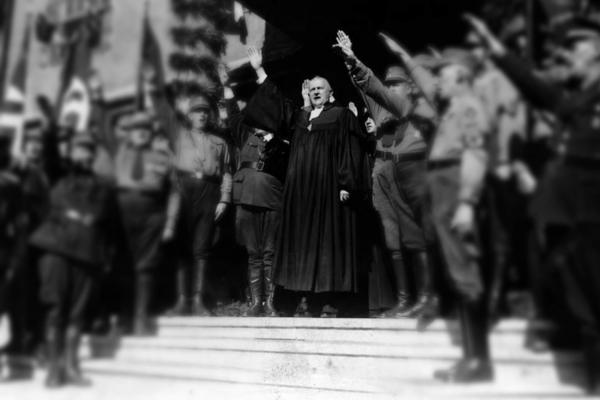Gerhard Kittel, a professor of New Testament at the University of Tübingen, joined the Nazi Party in May 1933. One month later, he gave a speech on “The Jewish Question” and said:
The violent extermination of the Jews is not a serious option: if the systems of the Spanish Inquisition or the Russian pogroms did not succeed, it seems highly unlikely this will happen in the twentieth century. Nor does the idea make any moral sense. A historical reality like this one may be resolved through the extermination of this people at most in demagogic slogans, but never in actual historical circumstances.
Kittel is best known for being one of the founders and editors of the Theological Dictionary of the New Testament which became a standard academic reference for anyone studying the New Testament from 1933 — when the dictionary was first published — through today. But it’s in this lesser known speech delivered at Tübingen that he explicitly confronts the question of what Germany should do about the Jews in the midst of a regime seeking to purify the nation.
What stands out about Kittel’s speech is his attempt to embrace Nazi politics while rising above what he believes to be exaggerated rhetoric. He dismisses the possibility of systemic violence against Jews. Instead, Kittel argues for an ethical white Christian nationalism in which Jews assume a guest-status and German Christians pursue an ethno-national ideal that he believes is sanctioned by God.
Lately, I have been asking myself the following question: How can sincere Christians embrace white nationalism? My question stems less from surprise and more from a desire to understand the mechanics. In church circles and in seminary, I heard about Barth, Bonhoeffer, and those who resisted. But I rarely heard about the majority of white Christians who supported a demagogue whose rhetoric had violent consequences.
A Church Undone: Documents from the German Christian Faith Movement, 1932-1940 by Mary Solberg is a sobering read that provides some clues. Published in 2015, Solberg’s book is a collection of primary sources, most of which had not been previously translated into English, written by nationalist German Christians. These documents reveal authors who are sincere in their faith even as they celebrate Martin Luther’s anti-Semitism, imagine a heroic Jesus, and try to strip Christianity of all Jewish influence.
Upon an initial reading of these documents, two things stood out to me: the effort to sanctify and naturalize ethno-nationalism, and the effort to redefine who counts as one’s neighbors. Several months before Adolf Hitler became chancellor in January 1933, a pastor named Joachim Hossenfelder wrote in The Original Guidelines of the German Christian Faith Movement: “We recognize in race, ethnicity [Volkstum], and nation, orders of life given and entrusted to us by God, who has commanded us to preserve them.”
For these nationalist Christians, preserving and purifying German culture was about protecting God’s creation of distinct cultural boundaries. They believed that Christians were to help others, but not in such a way that diminished what they deemed to be the cultural integrity of their particular nation. As Hossenfelder put it, “We are conscious of Christian duty toward and love for the helpless, but we also demand that the people be protected from those who are inept and inferior.”
The rhetoric German Christian nationalists used to describe Jews and outsides oscillated. For example, a group of pastors in the town of Oberhausen wrote: “Are we then rejecting the transnational mission of Christianity? Not at all. We respect the religious and ecclesiastical individuality of other nations, but we believe that German Christianity is the religion that is ideally suited for Germans.” In some instances, it sounds as though there is room for all cultures to be respected as long as certain boundaries are not trespassed. Nevertheless, the same group of pastors say, “The Jews are the elements of decay in our Volk, therefore we stand against them in an uncompromising struggle. The Jews are our misfortune.”
It’s a white nationalist sleight of hand. The logic goes something like this: “We’re not against other cultures. We’re against other cultures invading and mixing with our culture. So, we need to protect our culture which is great [and superior to other cultures].”
The ethno-nationalist impulse coincides with an effort to redefine one’s neighbors and rationalize the mistreatment of “foreigners.” Two months after Hitler took power in 1933, the Nazi regime passed the Law for the Restoration of the Professional Civil Service — legislation that barred non-Aryans from civil service. The theological faculty of the University of Erlangen wrote a statement in response and argued: “As part of the struggle for the renewal of our people, the new government has excluded men of Jewish or half-Jewish descent from holding important offices. The church must recognize the state’s fundamental right to implement lawful measures.” For these theologians, the state’s right to protect its ethno-national identity made it ethically permissible to strip certain groups of rights no matter how long they had lived in or contributed to the country.
Ludwig Müller, who became the Nazi-sanctioned Reich Bishop, went so far as to “Germanize” Jesus’ Sermon on the Mount. In his 1936 translation, Jesus says: “Happy are those who are at peace with their fellow Germans [Volksgenosse]; they do God’s will … Do not remain unreconciled to the fellow member of your own people [Volksgenosse] with whom you are on bad terms. Do not allow your dispute to go so far that it becomes impossible to come to terms and be reconciled.”
Müller explicitly retranslates how Jesus talks about love of neighbor to fit within an ethno-nationalist framework. In doing this, he captures how German Christian nationalists had already redefined who counted as their neighbor. If neighbors can be defined primarily as the “non-foreign” members of one’s nation first, then one can morally justify all sorts of actions against people who are categorized as outsiders.
It’s difficult to make direct comparisons between Nazi Germany and the United States today. Our contexts are not the same. Moreover, one does not need to look outside of the United States to find precedents for white Christians rallying around a political movement that sees others as less than human. This nation went at war with itself over it. This nation was violently founded and expanded upon such a premise. Nevertheless, there are important lessons and warnings to be learned from what happened in Germany.
I don’t think any of us are capable of predicting exactly where hateful ideas and hateful rhetoric lead to. But we can be sure that they lead to bad places. Trump’s white Christian base isn’t exactly the Reich Church. But we can and should call out any parallel logics.
I recently came across a disturbing article from a notable conservative Christian writer titled How (Not) To Think About The Caravan. These words stopped me in my tracks:
This blog used to have a regular commenter from Germany, an unbeliever who was angry at German Christians for pushing mass migration into his country. His basic point was that these Christians were making irrevocable decisions that would dramatically affect the quality of life of every German.
The Bible tells Christians to love their neighbors as they love themselves. But who is their neighbor? The man next door? Yes. The people who live across town? Surely. Those who live in another part of their country? Okay. People from another country who want to settle in their country? Erm… .
If everybody is your neighbor, then nobody is.
Got something to say about what you're reading? We value your feedback!







